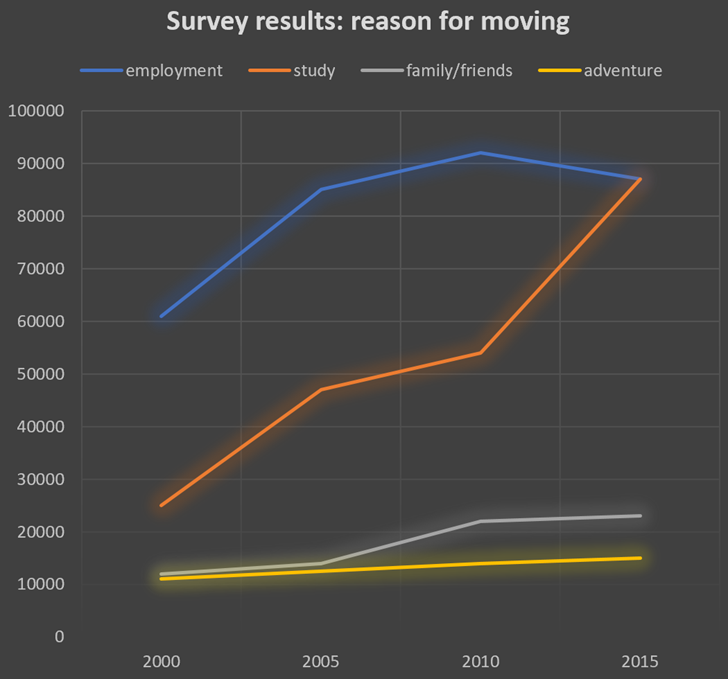You should spend about 20 minutes on this task.
The line chart below shows the results of a survey giving the reasons why people moved to the capital city of a particular country. Summarise the information by selecting and reporting the main features, and make comparisons where relevant.
Write at least 150 words.

Sample Answer 1
The line graph sets out the key motivations for people relocating to the capital of a specific country between 2000 and 2015. Moving for the study saw the most significant rise, with a jump of approximately 62,000. It rose considerably in two periods – from 2000 to 2005 (by 22,000) and then again from 2010 to 2015 (by 33,000), with a more gentle growth of around 7,000.
Elsewhere, the figure of people relocating for work began at 61,000 in 2000, then peaked at 92,000 in 2010 – the highest of any reason, in any year – before finishing as the joint-highest in 2015 (87,000 – on a level with those relocating to study). Notably, this category was the only one that underwent a downturn.
Turning to ‘adventure’, this category rose the most stably and steadily of all four types, from 11,000 to 15,000 over the fifteen years. Meanwhile, the number of people relocating for ‘family and friends’ reasons climbed gently in the first five years (12,000 to 14,000), followed by an upswing to 22,000, before eventually leveling off at around 23,000 in 2015.
Sample Answer 2
The line graph depicts the primary reasons people relocated to a specific country’s capital between 2000 and 2015. It can be seen that while employment was the key factor leading to people being displaced, moving to study saw the most significant overall increase.
The number of people relocating for work started at around 60,000 in 2000, then steadily rose to reach its peak of 92,000 in 2010, making it the highest number recorded in any year. However, it was the only reason whose figures experienced a downward trend, finishing at under 90,000 by 2015.
Studying witnessed the most significant increases, by 22.000 from 2000 to 2005, and again from 2010 to 2015, becoming the joint-highest number – 88.000. A more gradual growth of around 5000 was also recorded between those periods.
The number of people relocating for family and friends climbed moderately in the first five years (12,000 to 14,000), followed by an upswing to 22,000, before eventually leveling off at around 23.000. Adventure, with its minor increase from 11.000 to 15.000, was proclaimed the least popular reason for moving over the fifteen years.
